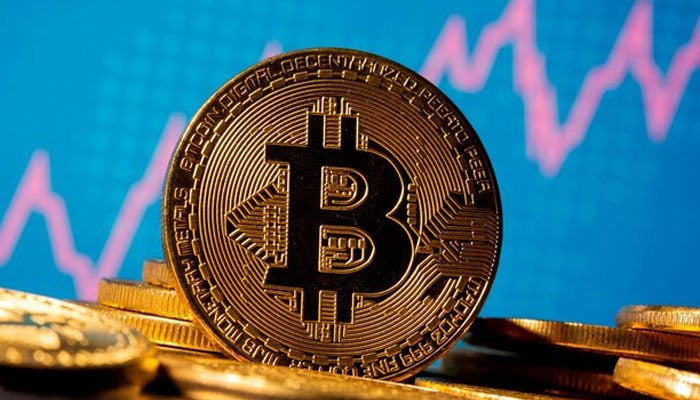Crypto dilemma
Digital currency jumps by over 50% since Trump’s victory in presidential elections in early November
The PSX is not the only market to have surged past a six-figure barrier this month. The world’s largest cryptocurrency: Bitcoin, has now risen past the $100,000 mark on the back of US President-elect Donald Trump’s return to power. His pro-crypto stance and nomination of a pro-crypto head for the US securities regulator has helped sparked a bullish run in the Bitcoin market. The digital currency has jumped by over 50 per cent since Trump’s victory in the presidential elections in early November and has risen by 140 per cent since the start of the year. However, anything that rises so quickly can fall just as fast and the volatility of Bitcoin and cryptocurrencies in general is one of the many factors that have made regulators across the world wary of this new class of digital finance. As far as Pakistan is concerned, local traders and investors are mostly spectators when it comes to the cryptocurrency world, with the state banning the trading and mining of virtual currencies back in 2018.
Pakistan’s approach is in line with that of the largest economy in the Global South, China, where the government has banned cryptocurrency mining and transactions but is coming up with its own Central Bank Digital Currency. And while cryptocurrencies are still legal in India, the government has cracked down on several of the largest crypto exchanges and reports claim that most of its regulators are in favour of more stringent measures against the industry including bans. Crypto also has plenty of sceptics in the developed world, although regulators there have been relatively more lenient thus far. So, aside from volatility, what is it about crypto that has attracted such widespread regulatory backlash? To answer this question one has to start with what cryptocurrencies like Bitcoin really are.
Unlike regular fiat currencies, crypto currencies are not issued by any central authority and are, in theory, immune to government manipulation or interference. Instead, most cryptocurrencies are based on a decentralised network of computers and secured by cryptography, making them nearly impossible to counterfeit or double-spend. They can also facilitate payments cheaper and faster by ditching the need for third-party intermediaries like banks, something that would theoretically help a country that relies as heavily on cross-border remittances as Pakistan. The lack of government regulation can also help circumvent sanctions, often unjustly imposed by the West on the Global South. However, it is precisely this anarchical aspect of crypto that has many worried. There have been reports of criminal and terrorist organisations using crypto currencies. It is also unclear what impact of the increasing adoption of crypto will be on the traditional fiat-based financial system and the billions who currently depend on it for basic amenities and development. This is all without even getting into the damaging effects energy-intensive crypto mining has on the environment and its vulnerability to unethical practices. But simply banning new technologies is never a good solution. Attempts to come up with something that can offer the benefits of crypto while mitigating its risks, as being done in China, should be encouraged. One must also note that crypto currencies will impact many other tech developments including microprocessor development for faster computers and better software too. Blanket exclusion from this market as is being done in Pakistan risks leaving the country out of many important tech developments.
-
 Katherine Schwarzenegger Shares Sweet Detail From Early Romance Days With Chris Pratt
Katherine Schwarzenegger Shares Sweet Detail From Early Romance Days With Chris Pratt -
 Jennifer Hudson Gets Candid About Kelly Clarkson Calling It Day From Her Show
Jennifer Hudson Gets Candid About Kelly Clarkson Calling It Day From Her Show -
 Princess Diana, Sarah Ferguson Intense Rivalry Laid Bare
Princess Diana, Sarah Ferguson Intense Rivalry Laid Bare -
 Shamed Andrew Was With Jeffrey Epstein Night Of Virginia Giuffre Assault
Shamed Andrew Was With Jeffrey Epstein Night Of Virginia Giuffre Assault -
 Shamed Andrew’s Finances Predicted As King ‘will Not Leave Him Alone’
Shamed Andrew’s Finances Predicted As King ‘will Not Leave Him Alone’ -
 Expert Reveals Sarah Ferguson’s Tendencies After Reckless Behavior Over Eugenie ‘comes Home To Roost’
Expert Reveals Sarah Ferguson’s Tendencies After Reckless Behavior Over Eugenie ‘comes Home To Roost’ -
 Bad Bunny Faces Major Rumour About Personal Life Ahead Of Super Bowl Performance
Bad Bunny Faces Major Rumour About Personal Life Ahead Of Super Bowl Performance -
 Sarah Ferguson’s Links To Jeffrey Epstein Get More Entangled As Expert Talks Of A Testimony Call
Sarah Ferguson’s Links To Jeffrey Epstein Get More Entangled As Expert Talks Of A Testimony Call -
 France Opens Probe Against Former Minister Lang After Epstein File Dump
France Opens Probe Against Former Minister Lang After Epstein File Dump -
 Last Part Of Lil Jon Statement On Son's Death Melts Hearts, Police Suggest Mental Health Issues
Last Part Of Lil Jon Statement On Son's Death Melts Hearts, Police Suggest Mental Health Issues -
 Leonardo DiCaprio's Girlfriend Vittoria Ceretti Given 'greatest Honor Of Her Life'
Leonardo DiCaprio's Girlfriend Vittoria Ceretti Given 'greatest Honor Of Her Life' -
 Beatrice, Eugenie’s Reaction Comes Out After Epstein Files Expose Their Personal Lives Even More
Beatrice, Eugenie’s Reaction Comes Out After Epstein Files Expose Their Personal Lives Even More -
 Will Smith Couldn't Make This Dog Part Of His Family: Here's Why
Will Smith Couldn't Make This Dog Part Of His Family: Here's Why -
 Kylie Jenner In Full Nesting Mode With Timothee Chalamet: ‘Pregnancy No Surprise Now’
Kylie Jenner In Full Nesting Mode With Timothee Chalamet: ‘Pregnancy No Surprise Now’ -
 Laura Dern Reflects On Being Rejected Due To Something She Can't Help
Laura Dern Reflects On Being Rejected Due To Something She Can't Help -
 HBO Axed Naomi Watts's 'Game Of Thrones' Sequel For This Reason
HBO Axed Naomi Watts's 'Game Of Thrones' Sequel For This Reason




